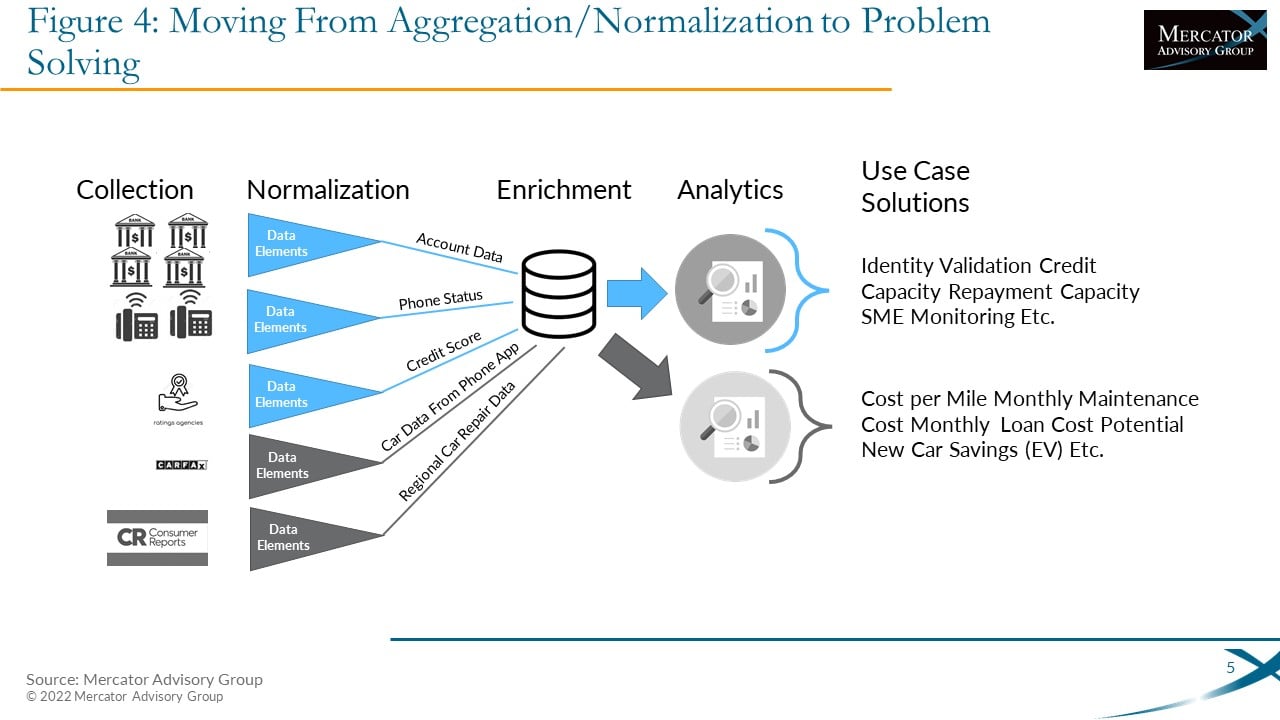Overview
Data Aggregation - How Will You Share Your Data?
Data aggregation is, at its core, the process of taking a myriad set of information sources and bringing them together in a consolidated manner so that they can be analyzed. Over time, aggregated data can be utilized for drawing conclusions about averages, trends, and behavioral outliers. Data aggregation utilizes screen scraping and API-enabled data sharing, the latter being more reliable and secure but also less common and, hence, more restrictive. The use of the API should be a key consideration as you develop your API strategy, but that strategy will also be shaped by decisions regarding if, and how, the institution will offer its customers other financial solutions such as net worth, financial wellness, wealth management, or simple budgeting. It will also need to take into consideration what data you intend to share with others, the impact the API access volume will have on existing platforms and middleware, and how security and privacy will be managed.
Mercator Advisory Group released a new report covering data aggregation titled Data Aggregation: Empowering FI Decision Making. This research looks at the data aggregation market. It discusses how your data aggregation plan will effect your business and what actions you need to take to manage the aggregation.
"The financial institution needs to recognize that there is a wider range of financial issues that their customers would appreciate assistance with—such as home management, home/car maintenance, rent evaluation, and education expenses—and that fintechs are already starting to respond to these needs. These solutions need access to a wide range of data not maintained within the financial institution and are rarely available through existing financial data aggregators," Tim Sloane, Vice President Payments Innovation, Mercator Advisory Group.
This document contains 23 pages and 6 exhibits.
Companies mentioned in this research note include: Aiia, Argyle, AXWAY, b.Link, Bank of America, BankingSDK, BanqUP, Basiq, Belvo, BirAPI, Black Knight, Brankas, Bridge, Budget Insight, Capital One, Charles Schwab, Chase, Citadel, Citibank, Dapi, Decentro, Dell Boomi, Direct ID, Early Warning, enable:Banking, Enfuce, Envestnet | Yodlee, equensWorldline, Equifax, Experian, Fannie Mae, Fidel, Fidelity Investments, Figo, Financial Data Exchange, Finicity, Finleap, Fintecture, FIS Global, Fiserv, FriendlyScore, Hazy, Househappy, Ibanity, JPMorgan Chase, Klarna, LUXHUB, Mastercard Open Banking, Moneyhub Enterprise, Mono, MX, Neonomics, Nordic API Gateway, Nordigen, Open Payments Europe, OpenWrks, PenFed, Pinwheel, Plaid, PNC Bank, Quanto, Salt Edge, Tarabut Gateway, Teller, The Clearing House, TIBCO, Tink, Token.io, Transunion, Trio, TrueLayer, Truist , U.S. Bank, Unnax, VISA, Wells Fargo, Yapily, Yolt Technology Services.
One of the exhibits included in this report:

- Overview of Market Dynamics
- The Financial Data Exchange Standardization Effort
- Why APIs Are Unlikely to Fully Displace Screen Scraping
- How Aggregation Will Impact Your Authentication Strategy
- The Evolution of Aggregation Platforms
- Potential Aggregation Use Case Specific Solutions
- The Aggregators Considered
Book a Meeting with the Author
Related content
2025 Emerging Biometric Authentication at the Point of Sale Scorecard
This inaugural Javelin Strategy & Research scorecard assesses the emerging market for biometric authentication at the point of sale and identifies three Pillars in this emerging te...
2026 Emerging Payments Trends
In emerging payments, hype comes first, often well in advance of the actual broad use of the payment tools and technologies. In 2026, after a year of press releases heralding the t...
Digital Money Comes to Payments, but the Crypto Has Disappeared
Digital money has come to payments, but the now isn’t the future that was once envisioned. “Cryptocurrency”—the word and the experience—is receding, and moving value through digita...
Make informed decisions in a digital financial world